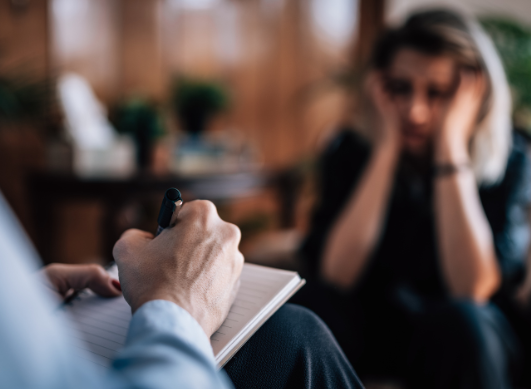- Home
- Forums
- Depression Forum
- Living with anxiety and other mental illnesses
- 13 Things to Remember When You Love a Person Who Has Depression
Patients Depression
13 Things to Remember When You Love a Person Who Has Depression
- 200 views
- 10 times supported
- 13 comments
All comments
Go to the last comment
Unregistered member
In some ways I wish my ex had seen this, in other ways I think he just used my depression as an excuse to end our marriage.
Have you heard of the author Matthew Johnstone he wrote about living with his depression in his book called I had a black dog and then later used the experience of his wife to write Living with a black dog.
These were later turned into videos that you can find on his website and I think the are on youtube as well.
I've included the link to his videos below. (I hope that is okay)
https://matthewjohnstone.com.au/courses/i-had-a-black-dog/videos/

Rosha43
![]()
Rosha43
Last activity on 13/08/2016 at 12:18
Joined in 2016
12 comments posted | 4 in the Depression Forum
Rewards
-
Contributor
-
Explorer
-
Friend
-
Newsfeeder
Do you have a friend or family member that suffers from depression or perhaps bipolar disorder? Not only is this very upsetting to the depressed person, but it can cause much frustration in those among their family and friends. Some hold back from trying to help such a person for fear that they will make them worse. What are some things that you can do to be a support to a depressed person?
The first step is to reassure your love for the person. They may feel like their illness makes them unlovable. Make sure to distinguish clearly in your own mind the difference between the illness and the person. This often takes a lot of patience and love. For example, at times, a bipolar person may not like being around other people, but don't take this personally. Keep being their friend.
Another step to supporting a depressed person is to do research about their particular condition. This can give you and them special insight into the way they think and act. This can help you see to what extent their illness is affecting them. This will also help you treasure the person behind the illness. You might even consider accompanying your friend or family member to the doctor so that they feel like they are not alone.
Good communication is essential when dealing with a depressed person. Misunderstandings can easily arise on either side. Being constantly kind and forgiving will reassure the person that you are there for them and understand what they are going through. You will also want to avoid making the person feel that they are responsible for their own suffering and that if they only exercised enough willpower, they could get better.
Try to be empathetic. This means putting yourself in the sufferers place and think of how you would feel or want to be treated. Try to see things from their point of view. Do not expect too much from them. When a depressed person feels accepted for who they are, they can gradually gain confidence. They thrive under a non-judgemental atmosphere.
Make yourself available. Another big help to a depressed person is to assure them that you are there for when they need a listening ear. Of course for them to trust this, you must follow through on your promises. If they sense you are too busy, they likely will not try to unburden themselves any further. Many depressed persons are comforted by the thought that they have an empathetic friend who is only a phone call away.
Be careful about what you say to a depressed person. Try to speak positively, but don't overdo it. Sometimes being too cheerful can give the depressed person the impression that you really just don't get how they feel. Instead, find something that you can commend the person for. Perhaps it is the way they care for their husband, wife, children, parents, or home. By offering sympathetic words and kind constant help, you can help a depressed person carry their heavy burdens.

Unregistered member
That was very helpful advice thanks im still stuck with what to do due to stop talking to a friend and used to date and go out with and used to go to college with and used to be close friends with and regretted cheating on him and feel like I have lost his friendship and feel broken
Give your opinion
Survey
Survey
Members are also commenting on...
Living with anxiety and other mental illnesses
Suicidal thoughts, not coping, how to get treatment without carrying out my plans?
![]()
![]()
![]()
![]()
![]()

jenlei14
I take each day as it comes, try to have a focus for that day. Today is pretty good, but it gives me a nudge every now and again. H
See the best comment
Living with anxiety and other mental illnesses
Suicidal thoughts, not coping, how to get treatment without carrying out my plans?
![]()
![]()
![]()
![]()
![]()

jenlei14
I take each day as it comes, try to have a focus for that day. Today is pretty good, but it gives me a nudge every now and again. H
See the best comment
Articles to discover...

03/09/2025 | Testimonial
Treatment-resistant depression: "I relapse systematically at the same time every year."
Medication fact sheets - patient opinions...
Subscribe
You wish to be notified of new comments
Your subscription has been taken into account






Unregistered member
I found this on Facebook - it was linked from this site: medprecautions.com
1. Depression is not a choice.
Depression is one of the most helpless and frustrating experiences a person can have. It’s sometimes feeling sad, sometimes feeling empty, and sometimes feeling absolutely nothing at all. There are times when depression can leave someone feeling paralyzed in their own mind and body, unable to do the things they used to love to do or the things they know they should be doing. Depression is not just a bad day or a bad mood and it’s not something someone can just “get over.” Remember no one chooses to be depressed.
2. Saying things like “it’ll get better,” “you just need to get out of the house,” or “you’ll be fine” is meaningless.
It’s easy to tell someone these things because you think you’re giving them a solution or a simple way to make them feel better and to ease their pain, but these kinds of phrases always come across as empty, insulting, and essentially meaningless.
Saying these phrases to them only create more tension within, making them feel as though they’re inadequate, and like you’re not acknowledging what they’re going through by trying to put a band aid on a much larger issue. They understand you’re just trying to help but these words only make them feel worse. A silent hug can do so much more than using cliched sayings.
What you can say instead:
I’m here for you. I believe in you. I believe you are stronger than this and I believe you’ll get through this. What can I do to help you? What do you think would make you feel better?
Avoid offering advice but instead just let them know you’re there for them and ask them questions to help guide them in discovering what could make them feel better.
3. Sometimes they have to push you away before they can bring you closer.
People who suffer from depression often get frustrated with feeling like they’re a burden on other people. This causes them to isolate themselves and push away people they need the most, mentally exhausting themselves from worrying about if they’re weighing their loved ones down with their sadness. If they become distant, just remember to let them know you’re still there, but don’t try to force them to hang out or talk about what’s going on if they don’t want to.
4. You’re allowed to get frustrated.
Just because someone deals with depression doesn’t mean you have to cater to all of their needs or walk around eggshells when you’re around them. Depressed people need to feel loved and supported but if it begins to create a negative impact on your life you’re allowed to acknowledge this and figure out how to show them love and kindness without self-sacrificing.
5. It’s important to discuss and create boundaries.
In those moments of frustration it’s important to take a step back and look at how you can help the depressed person while also maintaining your own sense of happiness and fulfillment. Be patient. Talk to them about your concerns and explain the boundaries you need to create within your relationship. Find out something that works for both of you.
6. They can become easily overwhelmed.
Constant exhaustion is a common side effect of depression. Just getting through the day can be an overwhelming and exhausting experience. They may seem and look totally fine one moment and in the next moment feel tired and have no energy at all, even if they’re getting plenty of sleep every night. This can result in them canceling plans suddenly, leaving events early, or saying no to things altogether. Just remember it’s not about anything you did. It’s just one of the prevalent side effects of living with the disease.
7. It’s not about you.
When you have a loved one dealing with depression it can be difficult to understand what they’re going through and to consider how their sadness is a reflection of your relationship with them. If they need space or become distant don’t blame yourself and wonder how you could do things differently to heal them. Understand their depression is not about you.
8. Avoid creating ultimatums, making demands, or using a “tough-love” approach.
Telling someone you’re going to break up with them or not talk to them anymore if they don’t get better is not going to magically cure them of their illness. They won’t suddenly become the person you want them to be just because you’re tired of dealing with their problems. It’s a personal decision to walk away from someone if their issues become too much for you and your relationship with them, but thinking the ‘tough-love’ approach will make them better is unrealistic and manipulative.
9. They don’t always want to do this alone.
Many often assume people dealing with depression want to just be left alone. While there are may be times when they want their space, this doesn’t mean they want to face their fears completely alone. Offer to take them on a drive somewhere. Ask if they want to get coffee or a meal. One on one time where you can bring them out of their routine and where you two can connect can often mean everything for them. Reach out to them unexpectedly. Remind them they don’t have to do this alone.
10. Try not to compare your experiences with theirs.
When someone is going through a rough time we often want to share with them our own stories to let them know you’ve gone through something similar and can relate with their struggle. When you say something like, “oh yeah, this one time I was depressed too…” it only makes them feel like you’re minimizing their pain. Express empathy but don’t suppress their feelings. The greatest resource you can share with your friend is your ability to listen. That’s all they really need.
11. It’s okay to ask your friend where they are in their feelings.
How are they really feeling and how are they coping with their depression? Suicidal thoughts are a common occurrence for depressed people and it’s okay to directly ask them ways they’re practicing self-care and to come up with a safety plan for times when their depression becomes too overwhelming.
12. Schedule time to spend together.
Offer to spend time with them once or twice a week to exercise, grocery shop, or hang out together. Ask if you can cook dinner with them and plan a friend date. One of the hardest parts of depression is feeling too exhausted to cook healthy meals, so you can really help them out by cooking food they can store in their fridge or freezer for a later time.
13. Just because someone is depressed doesn’t mean that they’re weak.
In his book Against Happiness: In Praise Of Melancholia, author Eric G. Wilson explores the depths of sadness and how experiencing mental anguish can actually make us more empathetic, creative people. Although he explains the difference between depression and melancholia, he rejects the idea of inflated happiness our culture and society is obsessed with, and instead explains why we reap benefits from the darker moments in life. Wilson writes:
“I for one am afraid that our American culture’s overemphasis on happiness at the expense of sadness might be dangerous, a wanton forgetting of an essential part of a full life. I further am wary in the face of this possibility: to desire only happiness in a world undoubtedly tragic is to become inauthentic, to settle for unrealistic abstractions that ignore concrete situations. I am finally fearful over our society’s efforts to expunge melancholia from the system. Without the agitations of the soul, would all of our magnificently yearning towers topple? Would our heart-torn symphonies cease?”
In a similar manner psychiatrist and philosopher, Dr. Neel Burton, discusses in his Tedx talk about how some of the most influential and important people in history have experienced depression. He explains the way our culture looks at and treats depression and how traditional societies differ in their approach, seeing human distress as an indicator of the need to address important life problems, not a mental illness.
It’s important to remember depression is not something that should be considered shameful and experiencing it doesn’t make someone weak or inadequate.